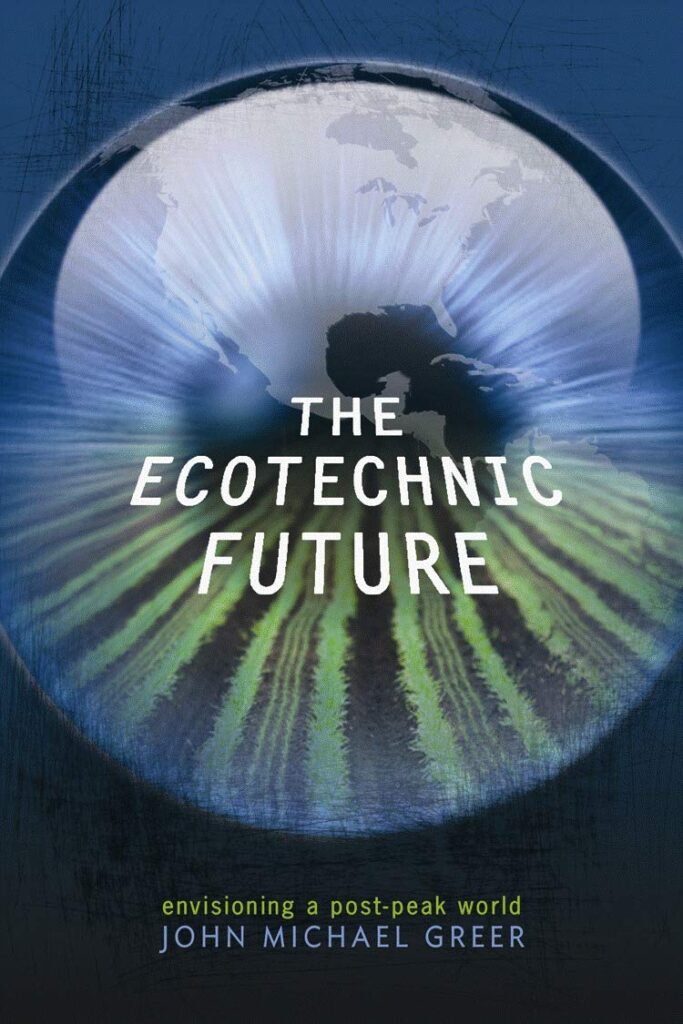An ecosystem view on human societies
Of all the many books on future outlook I’ve read, this is a rarity: it offers a scenario which I find plausible and even encouraging. John Michael Greer wrote The Long Descent, on how civilisations decline, and he combines these insights with his experience as an ecologist and organic gardener in this book.
I’m a great believer in ecosystems as a model for humanity, and Greer uses them here in a way which is quite different from my Natural Happiness approach. His focus is on the succession stages that an ecosystem grows through, from pioneer species at the start, to climax systems like mature forests.
He shrewdly observes that the industrial revolution had the characteristics of the pioneer phase in an ecosystem: it grew fast and spread rapidly by using resources (mainly fossil fuels) voraciously and inefficiently. In an ecosystem, the pioneer species decline as resources get scarcer, and he sees a similar stage already happening for contemporary industrial society.

In the long term, Greer is hopeful that human societies will reach a mature, sustainable, climax phase, which he describes as an ecotechnic stage, which would combine the better features of agrarian, sustainable, pre-industrial life, and of the modern era. However, there are interim stages, and this transition could take well into the next century or beyond. Sadly, as he says, “there’s likely to be a great deal of human suffering and disruption over the next few centuries”.
Deepening into his succession model, Greer highlights two main phases which human societies are likely to pass through before an ecotechnic era emerges:
Scarcity industrialism is the system adjusting to increasing shortages of fossil fuels, of food, and of healthy ecosystems.
The salvage society would emerge as energy supplies shrink further, focussed on recovering embodied energy, and prolonging the life of existing technology.
We can already see elements of these eras: as he points out, a lot will depend on how much energy, food, and salvageable stuff each country has. The shipbreaking in Bangladesh is a prime example of the salvage society.
What feels plausible and even encouraging about Greer’s views is that he accepts there’s huge disruption ahead, but he offers a picture of a viable form of humanity which could emerge beyond it, and highlights what we can do currently which would contribute to that prospect.
One of the many helpful ideas in this book is dissensus – the opposite of consensus. When the future is so uncertain, it’s best to try out a divergent variety of responses, rather than seek a consensus on one. He highlights two main areas where this experimentation is most desirable.
One is to create, or re-create, elements of a climax ecosystem form of human society: this would make little or no use of non-renewable resources. Small-scale organic farms, food processing, local food trading, would all be examples.

The second is to evolve and adapt forms of technology which could be part of the ecotechnic era. These would need to be energy efficient, robust, easy to fabricate and maintain. There are plenty of role models for this already: Permaculture Magazine is full of them, the Centre for Alternative Technology trains for them, and there’s great scope to evolve intermediate technologies that are tailored to the future context we’ll face (e.g. extreme climate, decentralised services, more limited mobility and communications).
The second part of the book has separate chapters exploring various potential elements of an ecotechnic society, including Food, Energy, Community, Science, etc. These will be the subject of a separate blog, coming soon.
As you can see, I highly recommend reading this book. There are two versions: the original, published 2009, and a 2021 update, published in the US by Founders House. My local bookshop could not order the new edition, so it seems it’s not distributed in the UK, but it can be bought online.
